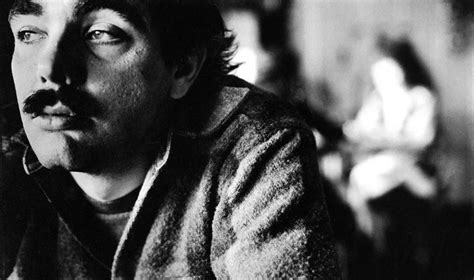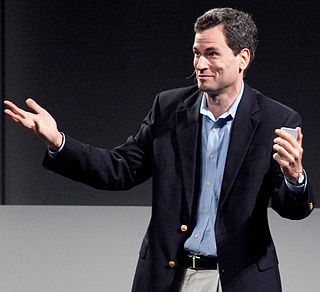Top 375 Inventing Quotes & Sayings - Page 7
Explore popular Inventing quotes.
Last updated on November 23, 2024.
Everybody's complaining about all of Trump's cabinet members, how rich they are, that's horrible. I'd rather have that than a bunch of people in Obama's cabinet that have never spent a minute making a payroll, creating a job, or a service, or inventing a product. What the hell is there about academics from the faculty lounge who don't know what they're talking about other than theoretically. Why not have a bunch of people who have succeeded wildly, sharing what they know, implementing what they know nationwide? I would much rather have that.
In the next century, we will be inventing radical new technologies - machine intelligence, perhaps nanotech, great advances in synthetic biology and other things we haven't even thought of yet. And those new powers will unlock wonderful opportunities, but they might also bring with them certain risks. And we have no track record of surviving those risks. So if there are big existential risks, I think they are going to come from our own activities and mostly from our own inventiveness and creativity.
Mankind . . . possesses two supreme blessings. First of these is the goddess Demeter, or Earth whichever name you choose to call her by. It was she who gave to man his nourishment of grain. But after her there came the son of Semele, who matched her present by inventing liquid wine as his gift to man. For filled with that good gift, suffering mankind forgets its grief; from it comes sleep; with it oblivion of the troubles of the day. There is no other medicine for misery.
Sitting for a picture is morbid business. A portrait doesn't begin to mean anything until the subject is dead. This is the whole point. We're doing this to create a kind of sentimental past for people in decades to come. It's their past, their history we're inventing here. And it's not how I look now that matters. It's how I'll look in twenty-five years as clothing and faces change, as photographs change. The deeper I pass into death, the more powerful my picture becomes. Isn't this why picture-taking is so ceremonial? It's like a wake. And I'm the actor made up for the laying-out.
We were doing the same thing. We will never have "a" Chicano English or Spanish because of regional differences. But I think that because of our bilingual history, we'll always be speaking a special kind of English and Spanish. What we do have to do is fight for the right to use those two languages in the way that it serves us. Nuevo-mexicanos have done it very well for hundreds of years, inventing words where they don't have them. I think the future of our language is where we claim our bilingualism for its utility.
Disease is the misery of our belief, happiness is the health of our wisdom, so that man's happiness or misery depends on himself. Now, as our misery comes from our belief, and not from the thing believed, it is necessary to be on the watch, so as not to be deceived by false guides. Sensation contains no intelligence or belief, but is a mere disturbance of the matter, called agitation, which produces mind, and is ready to receive the seed of error. Ever since man was created, there has been an element called error which has been busy inventing answers for every sensation.
Writing fiction lets you be a little more emotional and unguarded, a little freer. Writing fictional characters is also really different from writing about real people. In nonfiction, you can only say so much about the people you interact with. After all, they're actual people, their version of their story trumps yours. In a novel, you can build a character, using certain parts or impressions of someone you know, and guessing or inventing others, without having to worry that your guesses or memories or inventions are wrong.
I've always liked the idea of inventing stuff. My father told me, because I was naïve, I would think things could work and therefore do them, because I would have no doubt even though there was no solid foundation for this confidence. I don't think I would be a real inventor. But when I set out to do animation, which was my first step into film-making, I realised I could achieve this idea. I could take some elements, create a sort of clumsy invention, and make them work for the camera.
The analytical writer observes the reader as he is; accordingly, he makes his calculation, sets his machine to make the appropriate effect on him. The synthetic writer constructs and creates his own reader; he does not imagine him as resting and dead, but lively and advancing toward him. He makes that which he had invented gradually take shape before the reader's eyes, or he tempts him to do the inventing for himself. He does not want to make a particular effect on him, but rather enters into a solemn relationship of innermost symphilosophy or sympoetry.
On a more technical level, a story takes a lot of words. And to generate words and phrases and images and so on, that will compel the reader to continue reading - that stand a chance of really grabbing a reader - the writer has to work out of a place of, let's say, familiarity and affection. The matrix of the story has to be made out of stuff the writer really knows about and likes. The writer can't be stretching and (purely) inventing all the time. Well, I can't, anyway.
My love and I are inventing a country, which we can already see taking shape, as if wheels were passing through yellow mud. But there is a problem: if we put a river in the country, it will thaw and begin flooding. If we put the river on the border, there will be trouble. If we forget about the river, there will be now way out. There is already a sky over that country, waiting for clouds or smoke. Birds have flown into it, too. Each evening more trees fill with their eyes, and what they see we can never erase.
The Greeks used to use the same stories, the same mythology, time after time, different authors. There was no premium placed upon an original story, and indeed, Shakespeare likewise. A lot of people wrote plays about great kings. They didn't expect a brand-new story. It was what that new author made of the old story. It is probably the same now. We disguise it by inventing what seem to be new stories, but they're basically the same story anyway.
Today, there are over 7,000 languages spoken throughout the world. They may sound different, but in every case, they're drawing on the same regions of the brain. If you had told me that stone-tool-making had something to do with our ability to speak, I would have said you've got rocks in your head, but the latest studies indicate that once Homo erectus got creative with stone, our brains were on the way to inventing the most powerful tool of all: language.
We have come from God, and inevitably the myths woven by us, though they contain error, will also reflect a splintered fragment of the true light, the eternal truth that is with God. Indeed only by myth-making, only by becoming 'sub-creator' and inventing stories, can Man aspire to the state of perfection that he knew before the Fall. Our myths may be misguided, but they steer however shakily towards the true harbour, while materialistic 'progress' leads only to a yawning abyss and the Iron Crown of the power of evil.
It is a shallow criticism that would define poetry as confined to literary productions in rhyme and meter rhythm. The written poem is only poetry talking, and the statue, the picture, and the musical composition are poetry acting. Milton and Goethe, at their desks, were not more truly poets than Phidias with his chisel, Raphael at his easel, or deaf Beethoven bending over his piano, inventing and producing strains, which he himself could never hope to hear.














